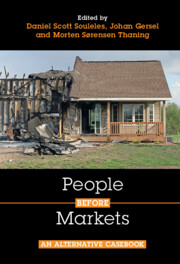Book contents
- People Before Markets
- People Before Markets
- Copyright page
- Dedication
- Contents
- Contents by Topic
- Authors
- 1 Introduction: Why Are You Here?
- 2 Some Philosophical Help with “Neoliberalism”
- Part I Our World
- Part II Our Lives
- Part III Our Work
- 18 What Should a Job Look Like?
- 19 How Should Innovation Work?
- 20 Who Should Get Investment Capital?
- 21 Who Should Own a Business?
- 22 How Should the Government Decide from Whom to Buy Stuff?
- Index
- References
19 - How Should Innovation Work?
from Part III - Our Work
Published online by Cambridge University Press: 27 October 2022
- People Before Markets
- People Before Markets
- Copyright page
- Dedication
- Contents
- Contents by Topic
- Authors
- 1 Introduction: Why Are You Here?
- 2 Some Philosophical Help with “Neoliberalism”
- Part I Our World
- Part II Our Lives
- Part III Our Work
- 18 What Should a Job Look Like?
- 19 How Should Innovation Work?
- 20 Who Should Get Investment Capital?
- 21 Who Should Own a Business?
- 22 How Should the Government Decide from Whom to Buy Stuff?
- Index
- References
Summary
When we think about how innovation happens, we’re at a bit of a loss to understand it because our common-sense notions of innovation owe so much to Silicon Valley hype and propaganda. When we imagine innovation, we often think about strong personalities, aggressive and spectacular disruption, and ruthless profit-seeking. Scroggins suggests that much meaningful innovation actually happens beyond attempts at dispruptive innovation and attraction of venture capital where innovation is narrowly seen as a driver of economic activity. Instead, innovation tends to emerge from stable, rather boring groups of people working outside of job markets and for-profit corporations, on projects that are of personal or group interest, valuable to the people working on them for intrinsic, seemingly self-evident reasons. To show this, Scroggins describes two paths both taken in the same Silicon Valley do-it-yourself biotechnology laboratory. A neoliberal approach tried to use the democratization of a technology, in this case synthetic biology, as a lever to implement the classic disruptive strategy of entering low-end and opening new markets. The alternative approach proceeded on a slower and more deliberate path, without market forces and the promise of funding. What separated the alternative from the neoliberal approach is, according to Scroggins, its constant focus on community over commodity, and process over product.
- Type
- Chapter
- Information
- People before MarketsAn Alternative Casebook, pp. 408 - 426Publisher: Cambridge University PressPrint publication year: 2022

